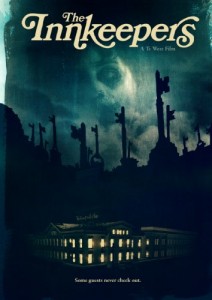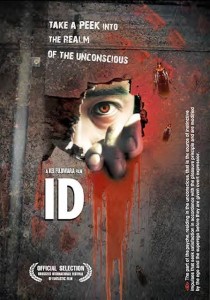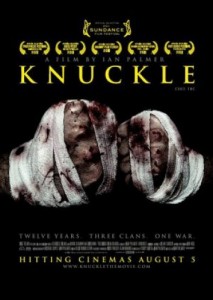
The Innkeepers

Plot: With the Yankee Pedlar Inn closing, workers Claire (Sara Paxton) and Luke (Pat Healy) take it upon themselves to hunt for Madeline O’Malley, the ghost rumored to be haunting the hotel. With the assistance of a guest, Leanne Rease-Jones (Kelly McGillis), a former actress turned psychic, they go in search of the ghost. They shortly discover they’ve bitten off more than they can chew.
Review: “The Innkeepers” isn’t a game changer. Ti West doesn’t take any chances, opting to play by the book. He’s more concerned in building tension and atmosphere, like in his previous film, “The House of the Devil”. He doesn’t dive into the ghostly shenanigans. He takes his time and slowly builds up to the thrills. This is a wise decision.
Since he’s not giving us anything essentially new, toying with our emotions through the use of sounds (such as creaks and bumps) and manipulation with camera movements is sagacious. He gets under the viewer’s skin and makes them question whether or not there is paranormal activity in the hotel. Considering this is a horror film, you know there is. The fact that he has you doubting is a compliment to West’s skills.
It also helps in making the scares during the finale more effective. They too aren’t anything new or groundbreaking. They’re your average “bump in the night” ghost scares. They do their trick and, thanks to the build, come across as more prominent than usual. I may have been salivating for more, but I got a decent helping.
The cast of characters is small, adding a sense of autophobia (with a dash of claustrophobia). Claire, Luke and Leanne are essentially the three characters we’re stuck with. An older gentlemen drops by and a mother and her son are briefly located inside the hotel. The latter does absolutely nothing, making me question why Ti West included them in the first place. Maybe there was a deeper meaning to it that went over my head. Maybe he decided halfway through he didn’t want to use a child in danger for cheap thrills. I may never know.
What I do know is that “The Innkeepers” is efficacious. It’s not wholly original or groundbreaking, but it serves it’s purpose. It did leave me clamoring for more, but didn’t fail in giving me the goods. There’s enough her to whet a horror aficionado’s appetite. Especially those who are tiring of the “Paranormal Activity” franchise.
Final Rating: B
Babygirl

Plot: Lena (Yainis Ynoa) lives with her single mother, Lucy (Rosa Arredondo) and baby sister. When her mother starts a relationship with Victor (Flaco Navaja), a man whose hit on Lena, she does her best to prevent it. She quickly learns she’s biting off more than she can chew.
Review: Yainis Ynoa has the weight of the world on her shoulders. “Babygirl” relies heavily on her performance. That’s a hard task for any actress, let alone one in her first role. She not only takes up this task but blows it out of the water with a stellar performance!
The film itself isn’t all too challenging, at least not until the final act. It’s a simple and somewhat routine tale of a single mother dating a man that’s clearly not right for her. Rosa Arredondo plays the clueless, lovestruck mother while Flaco Navaja plays the skeezy man seducing her. I would have preferred he toned back his performance, as he’s a bit too obvious at times. I know that’s the intention, but it would have been easier to believe that people are falling for his ruse if he were more convincing.
The strength of this film isn’t on his performance, though. It’s on Yainis Ynoa’s, who, as I mentioned, knocks it out of the park. She perfectly conveys the qualms teenagers face with their parents, as well as battling her own desires. She strikes up a relationship with Xavier (Joshua Rivera), but that quickly becomes complicated thanks to not only her mother’s relationship with Victor, but her friend who has an interest in Xavier as well.
As I mentioned earlier, it’s not until the final act that “Babygirl” really sets itself apart from the pact. Up until then, it’s a blunt drama. Macdara Vallelly does a fine job of moving that along and building towards the finale. He also has a good grip on Yainis Ynoa and has let her showcase her talent. She has a bright future ahead of her!
Final Rating: B
Id

Plot: A string of accidents in an isolated town seem to be tied to a murderer. When a woman is implicated in the death of a factory manager, these suspicions seem to be a reality. As the film rolls on, we learn reality is not what it seems.
Review: “Id” isn’t so much a film as it is an experiment. What I mean is that, though it has a story, Kei Fujiwara seems more concerned with testing the audience’s ability for the grotesque than he does in telling a cohesive tale. He’s also more concerned with dissecting the human characteristics that have become normal nowadays (such as the acceptance of sin as normal) and turning them on their head(s). For some, this will be a major turn off.
It wasn’t for me. Though the lack of a tenacious story is disinclining, the overall message Fujiwara sets out for is redeeming. I may have had trouble at times in following the story as I was more interested in the rather comely, yet dreary examination of perversion and gore. I know that comes across as an oxymoron, but that’s the kind of magic that Fujiwara weaves.
Despite having disgusting imagery such as mutilated genitalia, scalped faces, vomit and copious amounts of gore hurled at me, I never felt overwhelmed. I didn’t feel as if I was being assaulted into submission. That Fujiwara was being strange for the sake of being strange. There was an underlying message behind the madness. One that’s pretty clear.
A character’s assertation on why humans are like pigs is a clear representation on Fujiwara’s message. That being that we as humans are essentially put on this Earth to die and be fed to the system. That we are just as disgusting and shameless as pigs who stew in their own filth. Who are sloppy and, by all accounts, repulsive.
By utilizing imagery such as vomit, gore and excrement, Fujiwara highlights man’s shameless degradation. It will gross many out, as it should. That’s the point. It may be at the sacrifice of a cohesive narrative, but it gets the point across.
Final Rating: B
Knuckle

Plot: The McDonaghs and Joyces have been feuding for over fifty years. They settle their differences in bare-knuckle fights. Ian Palmer spends over twelve years documenting their feud, highlighting the fights and the trash talk.
Review: There are a few rules to the bare knuckle fights seen in “Knuckle”. No head-butting, no kicking, no biting and no grappling. The only body part you’re allowed to use as a weapon are your fists. The fights don’t end until there’s a knockout, someone quits or they both shake hands and the fight ends in a draw. There is no time limit. One fight went over two hours.
Though there are no clear cut good and bad guys, the audience will most likely side with the McDonaghs. That’s the family Ian Palmer follows around for twelve years. They’re the ones that are interviewed, most specially James Quinn McDonagh. He’s essentially the monarch of the family. He doesn’t believe in the fighting and wants it to stop. He knows that will most likely never happen.
We get a brief history of the family feud and see it develop from the mid-nineties onward. Every time it seems to cool down, the bad blood picks right back up. It’s a seemingly endless rivalry. Which means this isn’t a cut and dry documentary with a satisfying ending, per se. Most documentaries aren’t, though, so that’s not an issue for “Knuckle”.
The only true issue at hand with “Knuckle” is some of the editing. Every now and then, you get interviews that seem to be retreads of others and the editing itself could be a bit tighter. Other than that, it’s a stunning observation into families raised to be fighters. It’s brutal, it’s honest and it’s real.
Final Rating: B+
Thor at the Bus Stop

Plot: Today is the day that Thor (Jerry Thompson) will die. He must save the Earth by sacrificing his own life. As he mopes around town about his impending doom, he begins to wonder if it’s worth it. Those around him don’t seem to care and look at him judgmentally. With the fate of the Earth in his hands, will Thor rise to the occasion?
Review: I was a little worried going into “Thor at the Bus Stop”. With such an audacious title, I feared the final product would be insufficient. I was certain that Jerry and Mike Thompson had created a beast that would be hard to tame. A standard that was too high to reach. I wasn’t expecting high art, but was hoping for a good comedy.
Thankfully, I got just that! “Thor at the Bus Stop” is a clever and fast paced comedy that is actually smarter than it appears. It’s not filled with potty humor and low brow jokes. It’s occupied with a slew of interesting and likable characters. A bit too many, if I do say so myself, but they’re balanced out well.
A quick rundown of the characters. White Trash Chuck (Mike Thompson) is a loser desperately trying to be cool; Lester (Robert Shupe) is invisible to the world (he has a yield sign impaled in him, yet nobody takes notices or cares); Ultra Stan the Every Man (Joe Berry) is a chill pizza delivery man; Passenger Seat Pete (Chris McInroy) is a laidback and forgiving fellow; Trish (Dana Bomar) is Pete’s girlfriend, who doesn’t know how to handle his absurd kindness; Walter (Carlos Mathis-Johnson) is a surprisingly likable criminal with a heart of gold; Big Zed (G. Scott Thompson) and Little Fred (Bob Shaughnessy) are wannabe thugs; George (Andrew Jacobsen) and Abe (Jason Harris) are two men who argue as if they came out of a Quentin Tarantino film (preferably “Pulp Fiction”); Detective Mergatroy (Jason Neistadt) and Officer Berry (Trae Cullivan) are detectives on the case of sudden lightning (in the middle of a cloudless summer day) killing townsfolk; Bernard Barnard (Barrett Applegate) is the reporter on the case with help from his cameraman, Sancho (Joel Schoenbach).
As you can tell, there’s an overload of characters. Before you feel your mental system will crash, relax and take a deep breath. The Thompsons do a serviceable job of juggling all of them. They all run into Thor at one point or another, with each of their stories tying into his. His rage is causing the lighting strikes that are killing innocent citizens or, in Lester’s case, severely harming him. They’re all simply clueless that he’s the cause. The only person that will listen to him is Lolly (Lauryn Shelley), a little girl. Yes, it’s another character. Yes, the Thompsons handle her well too.
Moving at a fast pace, they shoot out jokes and observations on life at rapid fire. It’s a wonder they didn’t run out of steam early on. I do feel this could have been a short or Youtube series, as opposed to a full length film, but they surprisingly pull it off.
Not without their follies, mind you. They do lose their grip on their characters at one point, needing to tighten their grip and bring things back around. They tend to focus more on the human characters than the God of Thunder, which is admirable, but losing focus on the main selling point. It wouldn’t have hurt them to cut a few characters from the story to make things move smoother.
Despite the flaws, I was very forgiving of “Thor at the Bus Stop”. Simply put, I was having too much of a good time! I was laughing quite frequently and I found myself enjoying all of the characters. That’s a rarity in ensemble films, especially of the independent kind. The Thompsons are young directors, so it makes sense for them to stumble. They prove their worth by picking themselves back up and continuing onward. I’ll be keeping an eye out on their future projects!
Final Rating: B
